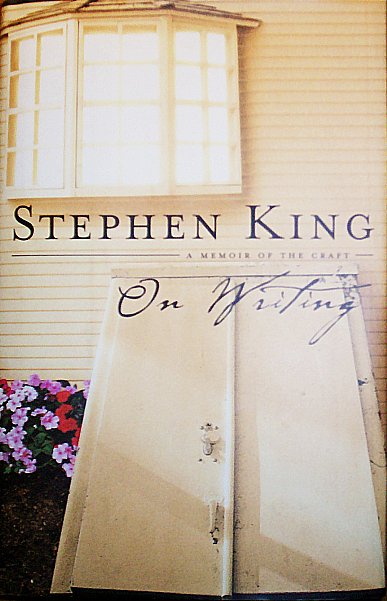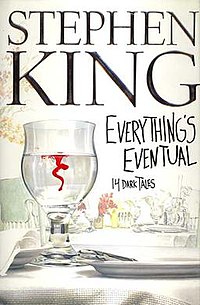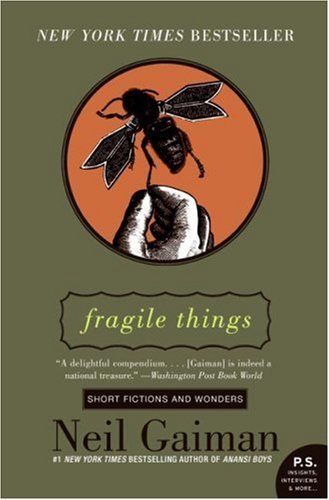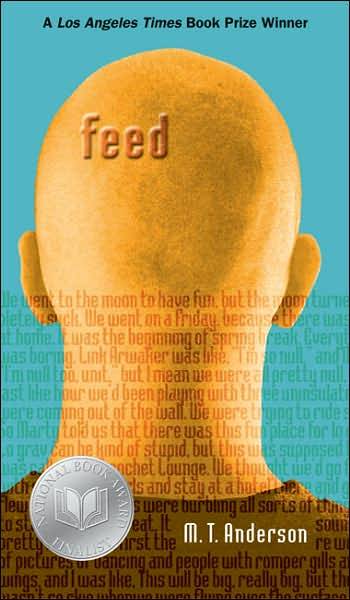
Sandman series (Neil Gaiman, various illustrators)
It should be pretty obvious to everyone by now that this series is my favorite book(s) of all time. They're beautiful, they're smart, they're fascinating... I could re-read these for the rest of my life. It's a long series, so I can't give a very short summary, but it mostly deals with the seven Endless, who are siblings that embody ideas: Dream (the titular Sandman), Death, Desire, Despair, Delirium (formerly Delight), Destruction, and Destiny. It's fantasy and a little science fiction with some horror, romance, and historical fiction elements at times.

The Martian Chronicles (Ray Bradbury)
I discussed this book for our Favorite Comfort Books post, but it bears repeating: I love this book. It's a collection of short stories, told in chronological order, about how man and Mars collide (not literally). My favorite stories include "There Will Come Soft Rains" (which I mentioned in the aforementioned post), "The Earth Men" (wherein the Earth men from the rocket are treated as mental patients), and "Usher II" (which should be partially self-explanatory if you are familiar with the work of Edgar Allan Poe).
The Hunger Games trilogy, particularly Catching Fire (Suzanne Collins)
Like Cassy, I love this trilogy. We went to the midnight premier of the first film together. My favorite book of the trilogy is Catching Fire (the second one). This is mostly because I love the arena. I hesitate to say any more than that, in case of spoilers, but I love a lot more about it, too. I cry at least a few times every time I read it, because I am THAT INVESTED in the characters.
Harry Potter series (J. K. Rowling)
I'm not a Potter nut, but I do really love these books. I love the way Rowling words everything, I adore the world she created, and I can still really get sucked into the story, even though I know all the plot points now. I was exactly the right age for these as they came out (I was a few months from turning eleven when the first was released) so I grew up with Harry Potter and loved every second of it. I bought Goblet of Fire while on a vacation because the release date fell in the middle of it, and I bought Deathly Hallows on release day and read it straight through, despite the screaming, searing migraine I had. (It just made me identify better with Harry's pain in his scar.)

Hitchhiker's Guide to the Galaxy "trilogy" (Douglas Adams)
This series is a five-book "trilogy" (a joke from the author himself). I'm a big fan of British humor and funny science fiction, and this is the quintessential combination of both. The movie was okay, the radio adaptation was interesting (and long), but I love the books. I also really liked Salmon of Doubt (a posthumous collection of Douglas Adams' writings) and Don't Panic! (a biography of Douglas Adams written by Neil Gaiman).


Good Omens: The Nice and Accurate Prophecies of Agnes Nutter, Witch (Neil Gaiman & Terry Pratchett)
The Clive Barker quote on the covers says it all: "The apocalypse has never been funnier." Leave it to two Englishmen to write a comedy about the son of Satan's birth and the end times it brings about. Those are two separate covers (I own a copy of the one on the left) depicting the demon Crowley (left) and the angel Aziraphale (right). There is a lot to this book, and every time I read it, I find new things.

Night (Elie Wiesel)
I've mentioned before that I really enjoy Holocaust literature (fiction or non-fiction) and that this was a runner-up for my favorite school-assigned reading. I read it in eighth grade, and while some of the content was shocking and off-putting, I could handle it, and I enjoyed reading Wiesel's story. I got the trilogy (which includes two novels, Dawn and Day) but I didn't enjoy the novels nearly as much as I liked his memoir.

The Handmaid's Tale (Margaret Atwood)
I know, this was also on Cassy's list. But I really love it. I love dystopia unabashedly, and the writing in this is just amazing.

On Writing (Stephen King)
This is King's memoir about the writing process. I read it in college while experimenting with writing fiction, and it was immensely helpful. The part that sticks out in my mind the most is where he talks about subjects and verbs. Any subject can be paired with any verb, but they don't always make sense together. Example: "Mountains jump." It's funny but informative, which is the best kind of non-fiction, if you ask me.

Everything's Eventual (Stephen King)
I used to be a huge Stephen King fan. That ended when I discovered Neil Gaiman's work (and simultaneously realized that the vast majority of King's novels are the same thing in the same setting over and over), but I still have a fondness for some of King's stuff. This is a collection of short stories that includes some of my favorites of all time. "Autopsy Room Number Four" is the first in the book and one of the best, telling a brief and terrifying story from the point of view of the man lying on the table in the autopsy room. "In the Deathroom" is a really intense story about a man in an interrogation chamber who wants to escape. "Everything's Eventual" is one of my favorite stories of all time, about a man with the ability to use written symbols to influence the world around him without knowing how it works. "Lunch at the Gotham Cafe" is about a meeting between a couple who is getting a divorce and their lawyers, which goes horribly, horribly wrong. (If you've read it: "Eeeeee.") "That Feeling, You Can Only Say What It Is In French" is about deja vu. A lot of it. "1408" was turned into a mediocre movie about a man staying in a haunted hotel room.

Fragile Things (Neil Gaiman)
Speaking of short story collections, here's another that has a lot of my favorites. "October in the Chair" is about October (the month, anthropomorphized) taking his turn telling a story to all the other months, gathered around a campfire. "The Facts in the Case of the Departure of Miss Finch" is about a woman who disappeared after visiting an unusual circus. (I hear it has been turned into a graphic novel that I can't wait to get my hands on.) "Locks" is a rewrite of Goldilocks in the form of a poem. "Instructions" has since been turned into a children's book, and tells you how to thrive if you find yourself in a fairy tale. "How to Talk to Girls at Parties" falls into the one-of-my-favorites-of-all-time category of short stories, and is about a young man talking to some strange girls at a strange party. "The Day the Saucers Came" is a poem about... well, the day the saucers came. A lot of other things happened that day, too. And I think an excerpt of this will likely show up at my wedding. "Sunbird," while not one of my favorite pieces of writing, is something I enjoy more for knowing its origin (it was written as a birthday gift for his daughter).
Uglies series (Scott Westerfeld)
This is one of those instances where I like the setting and the ideas better than I like the characters and the plot. (There are actually a lot of those.) The dystopia disguised as a utopia that Westerfeld built for this story is just amazing. That's not to say I don't like the characters or plot (because I do) but I like the setting even more.


Feed (M. T. Anderson)
More dystopia! This one is set in a world where most people have the feed (kind of like the internet) implanted in their brains. Anderson is a genius at writing believable dialogue with made-up teen speak from the future, much like Westerfeld is. I find myself talking like these characters after I read a few chapters. It's so quotable, too: "We went to the moon to have fun, but the moon turned out to completely suck" and "I don't know when they first had feeds. Like maybe, fifty or a hundred years ago. Before that, they had to use their hands and their eyes. Computers were all outside the body. They carried them around outside of them, in their hands, like if you carried your lungs in a briefcase and opened it to breathe." Tell me you don't want to hear more from that character.


Scary! Stories That Will Make You Scream! (Edited by Peter Haining)
I apparently really have a thing for horror in the short story format. I never realized that about myself. I had this list all finished, and I was satisfied with it. Then I was watching some old episodes of The Simpsons and came across season 3's "Treehouse of Horror" episode, which includes a segment called "Bart's Nightmare" which pulls heavily from a Twilight Zone episode called "It's a Good Life." I had intense deja vu while I was watching the episode, and I knew I had read it somewhere, so I took to the internet to figure it out, and discovered that Jerome Bixby wrote the story "It's a Good Life" that the episode was based on. That story is in, among other collections, this anthology. I read this book at least a hundred times between middle and high school, and probably more than that. It has stories from R. L. Stine, Roald Dahl, Ray Bradbury, Stephen King, Isaac Asimov, and others. (For the record, the stories never made me scream, but they did completely and utterly enthrall me, and affect the way I think about horror fiction to this day.)
I agree with a lot of your choices. I love the Hunger Games and Harry Potter of course. I'm a fan of utopian/dystopian lit also, so I will have to check some of those other books out.
ReplyDelete